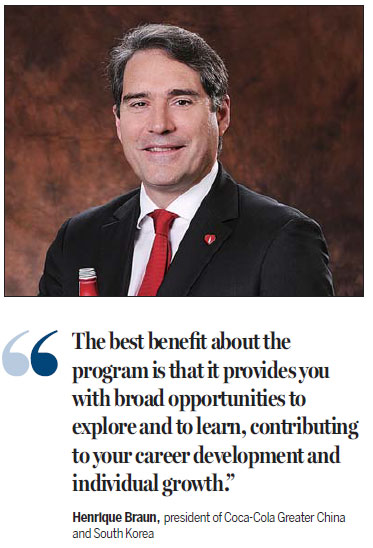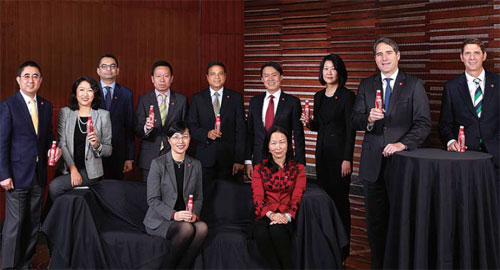Coca-Cola builds upon tradition of cultivating talent pool
One of the world's leading multinationals, Coca-Cola Co values its employees' personal development and offers opportunities to help advance their careers.
In 1996, a young Brazilian boy named Henrique Braun joined Coca-Cola as a new management trainee at the company's headquarters in Atlanta.
When Braun started his career at Coca-Cola as a technical engineer, he had already earned a master's in industrial engineering from Michigan State University and an MBA from Georgia State University.
As he took on assignments in North America, Europe, Latin America and Asia covering the company's supply chain, business development, market innovation and operation management, his resume grew more sophisticated.
He also worked in various functions at group headquarters and at one of Coca-Cola's bottling plants. After 19 years, Braun was promoted as president of Coca-Cola Greater China and South Korea, where he is responsible for the direction of the company's third-largest global market.
Braun realized his ambition at Coca-Cola thanks mainly to the management trainee system, through which the company is committed to cultivating the talent of college graduates.
At Coca-Cola, the talent pool is the cornerstone of the company's employee system.
Coca-Cola also promotes the program in China, where it provides career development opportunities for fresh graduates.
Every new class of trainees consists of around 10 candidates for a three-year program. During those three years, trainees transfer between Coca-Cola China's various business functions to quickly bolster their professional capabilities within the system.
"The best benefit about the program is that it provides you with broad opportunities to explore and to learn, contributing to your career development and individual growth," Braun said.
"During my three years as a trainee, my biggest gain undoubtedly came from collaborating with colleagues from different backgrounds. They inspired me and contributed invaluable insights for my career path."
The Coca-Cola DNA
Collaboration between colleagues of diverse upbringings is typical at a multinational company.
Coco Lu, vice-president of human resources at Coca-Cola Greater China and South Korea, can still recall the feelings inspired by her first visit to Coca-Cola's US headquarters.
It was, she said, as if she had stepped into a miniature version of the United Nations.
The variety of English dialects she heard in the Atlanta headquarters - such as Indian English and German English, among others - led her to realize that Coca-Cola was no longer a US company, but a "United Nations company," one that would likely prove an object of fascination to any linguist who by chance dropped by.
Lu worked for nearly two years in the US headquarters human resources department before being reassigned to China last year.
In order to achieve success, a true United Nations company must draw on a large pool of talent from different cultural and geographical backgrounds, and bring that set of employees together to work toward the same goals. This sort of inclusiveness, which fosters long-lasting prosperity, is written into the Coca-Cola DNA.
Coca-Cola understands that the key for its future success lies in identifying individuals who can clearly articulate their personal visions and dreams, and matching them to the corresponding resources and systems in the company.
"Talent referral," a process through which Coca-Cola encourages its employees to develop real talent beyond the requirements of their current work, is one of the key pillars of the company's talent cultivation strategy.
Employees should maintain goals for their career paths at the company, a strong desire to pursue career development and display a commitment to work hard for it. Achieving personal goals may require them to move to another country or to give up on their existing accomplishments by moving to a new division. A strong will to embrace new challenges is of the utmost importance.
Overseas assignment is a vital element in Coca-Cola China's strategy to cultivate its future leaders.
These future leaders will be deployed in a number of essential positions and put into key decision-making roles.
Some of them will be dispatched to work at US headquarters to better understand the company's global operation model.
'Shifting focus to China'
In recent years, an increasing number of outstanding Chinese employees have been assigned to positions at headquarters or other markets, forming a strong talent pool for Coca-Cola's global network and setting up a healthy mechanism for the movement of talent.
In the China market, however, it can be difficult to convince high-end talent to transfer internationally, partly due to family and social concerns.
The proportion of Chinese families in which both husband and wife have full-time careers is the highest in the world. And an international reassignment of either husband or wife produces a variety of family-related constraints.
In order to support more international talent from China, Coca-Cola Global is discussing the possibility of "shifting the focus to China" by relocating some of its global operations positions to China and engaging Chinese employees in core global projects.
Coca-Cola will continue to provide opportunities to those who want overseas work experience, but the company will also seek to create more opportunities for those who are unable to work overseas now but have strong growth potential to help them gain global experience while staying in China.
"Although over 90 percent of Coca-Cola China's employees are local, we cannot have a one-sided view of the localization strategy," Lu said.
"In Coca-Cola Global, management also hopes to maintain an appropriate ratio between local and international employees, which helps facilitate cross-regional and cross-border exchanges and the flow of talent."
A positive and healthy corporate culture will certainly encourage employees to challenge the unknown.
However, it is a system that is based on reciprocity between employer and employee. At Coca-Cola, every employee has his or her own experiences, and there are a wide variety of career paths to choose from.

|
The management team of the Coca-Cola Greater China and South Korea. Photos provided to China Daily |
(China Daily 02/27/2016 page10)















